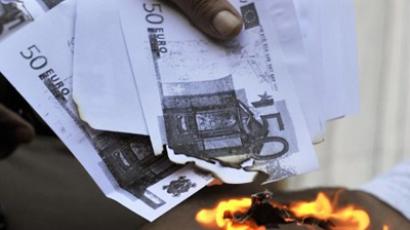More or Less: is EFSF enough?

Ministers of seventeen EU states are expected to increase the effective size of the EFSF to insure the bonds of indebted countries.
According to Reuters the ministers will vote on the increase in the firepower of the EFSF fund to 440 billion Euros which is less than the earlier proposed 1 trillion euros. According to draft guidelines obtained by The Associated Press, “bonds being issued in the future would receive fixed credit protection equal to 20 to 30 percent. The actual rate will be determined in light of market circumstances.” The fund will be provided with the cash from private and public investors. “In other words Investors will receive insurance or a guarantee on their purchases of euro zone sovereign bonds, like those of Spain or Italy,” says Anna Bodrova, analyst from InvestCafe. However the past rocky weeks in the EU which have seen poor bond auctions and yields skyrocketing have made investors uncertain about the effectiveness of the Euro group measures. Bodrova adds that the domino effect will lead to the appearance of new EU countries on the list to be downgraded due to “high debt and bad macroeconomic outlook” ultimately, “The EFSF fund would not be able to bailout all new comers as its funds are limited and the only function it has is the facilitation of bonds which is not enough to overcome the problem.” Meanwhile, Germany voted against increasing the firepower of the EFSF. Germany's Central Banker Jens Weidmann says “leveraging the assets could discourage politicians from taking the tough political decisions to cut budget deficits and would weaken faith in the euro.” However, Ministers are also likely to approve the next tranche of emergency loans for Greece and Ireland.














